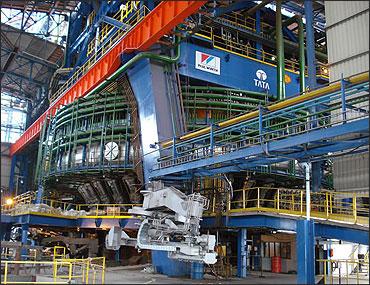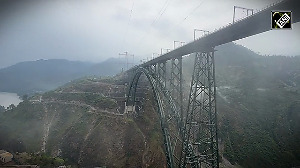The British government has been under pressure to help a sale process go through after Tata said it would sell its British business.

Tata Steel agreed to sell part of its British business to investment firm Greybull Capital on Monday, preventing thousands of job losses, and freeing it up to focus on the sale of its other big plant, in Wales.
The British government has been under pressure to ensure the plants are sold rather than shut down after Tata, one of the world's biggest steelmakers, said on March 30 it would sell its loss-making British business, putting 15,000 jobs at risk.
Greybull said it would buy Tata's Long Products Europe division in Scunthorpe, northern England, which employs 4,400, while the process to secure a buyer to save the Indian steelmaker's other major plant at Port Talbot in Wales also kicked off on Monday.
Greybull said it was arranging a 400 million pound ($570 mln) investment and financing package for the Scunthorpe business, as part of a deal which included agreement with suppliers and trade unions on resetting the business's cost base.
The deal, which will see the business renamed British Steel in a revival of a historic name last used almost two decades ago, is expected to complete in eight weeks subject to certain conditions being met, including a ballot of trade union members.
Prime Minister David Cameron, already grappling with rows over Britain's membership of the European Union, his budget and his tax affairs, has been scrambling to try to find buyers for Tata's assets to save jobs.
Tata put its British operations up for sale, citing a global oversupply of steel and cheap imports from China, high costs and weak domestic demand.
The deal for the Scunthorpe business would be done without any redundancies, said Greybull, adding that the acquisition was completed for a nominal 1 pound and also included two mills, an engineering workshop and a design consultancy in Britain, plus a mill in Hayange, France.
"We're expecting no redundancies going forward, the business plan calls for no redundancies," Greybull partner Marc Meyohas told reporters on a call.
Finding buyers for the Port Talbot assets, which employ 4,000 people, could take some time given the complexity of any deal, including negotiations over everything from pensions liabilities to energy subsidies.
Greybull said to date it had been wholly focused on the Scunthorpe deal, but declined to rule out future interest in the Port Talbot plant.
"Whether it's Tata or any other assets, we'll review it as and when is appropriate," Meyohas said.
Another potential bidder for the Port Talbot plant is Sanjeev Gupta, the boss of metals trader Liberty House Group.
He told Reuters on Friday that he was serious about making an offer and had the backing of a group with $7 billion of revenues, hitting back at critics who have questioned his capacity to take on a business dragged down by heavy debt and weak sales.
However, much will depend on how much any potential investor is willing to pay to even hope of turning around the business.
"It's a loss-making business and a loss-making business is not worth a lot in itself to buy," Gupta said.
"It's more of a question of what are the resources required in turning it around."
Britain's eurosceptic media has blamed Brussels for preventing London from taking greater steps to protect the industry while the opposition Labour Party has called on Cameron to do more to save the plants.
Tata, under former Chairman Ratan Tata, bought its UK steel operations in 2007 after outbidding Brazil's CSN to buy Anglo-Dutch steelmaker Corus for $12 billion as a way to access the European market. But the company struggled to turn the giant around.
Like its competitors such as top producer ArcelorMittal, Tata has been hit by plunging prices due to overcapacity in China, the world's biggest market for the alloy.
China said on Monday it wants to work with the rest of the world to find an appropriate resolution to overcapacity in the steel sector, after Britain asked Beijing to hurry up and tackle the problem.
Tata Steel is the second-largest steel producer in Europe with a diversified presence across the continent. It has a crude steel production capacity of over 18 million tonnes per annum in Europe, but only 14 mtpa is operational.
(Additional reporting by Freya Berry)












